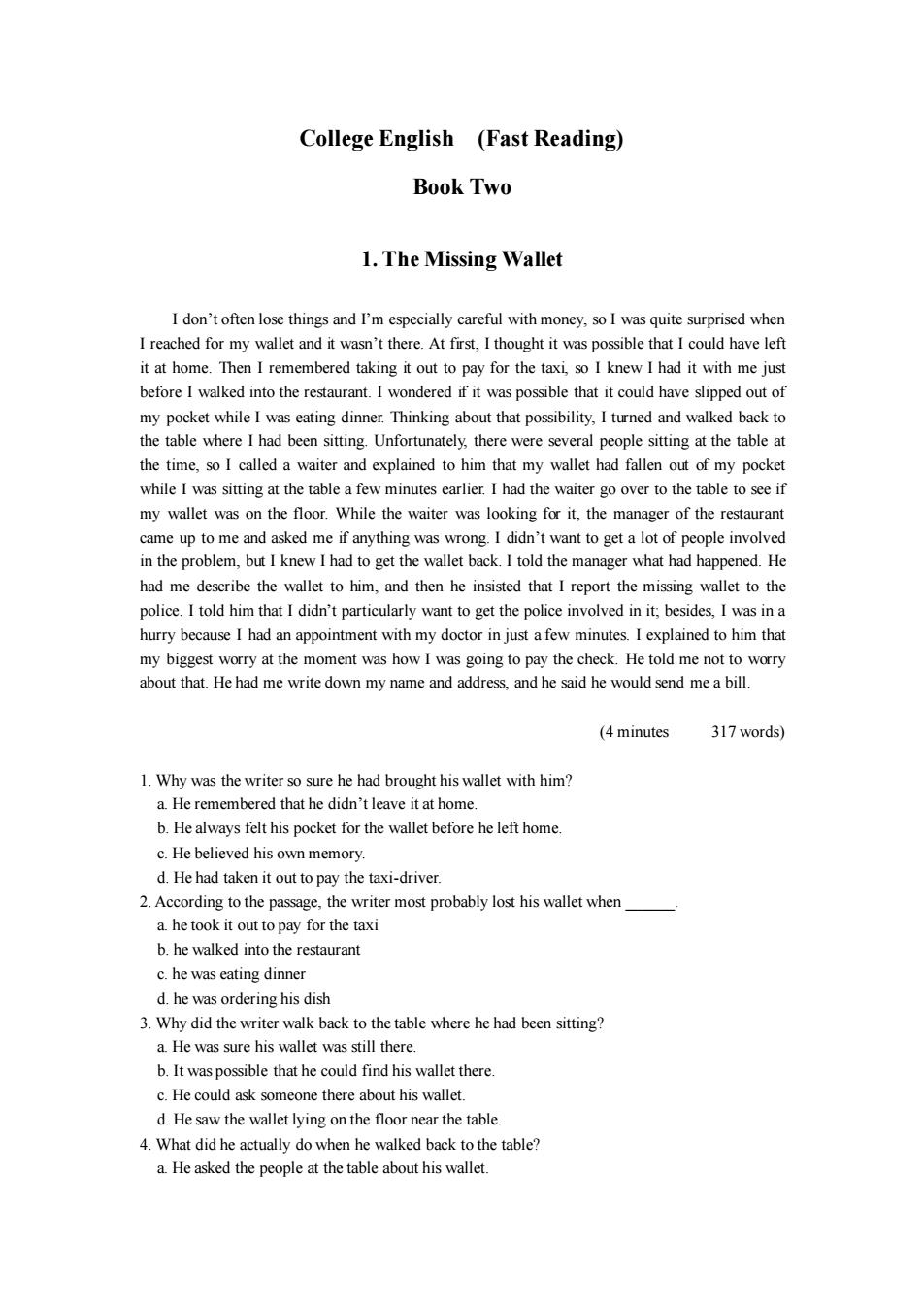
College English (Fast Reading) Book Two 1.The Missing Wallet I don'toftenose things and I'm especially careful with money,soI was quite surprised wher I reached for my wallet and it wasn't there.At first,I thought it was possible that I could have left it at home.Then I remembered taking it out to pay for the taxi so I knew I had it with me just before I walked into the restaurant.I wondered if it was possible that it could have slipped out of sitting at the table a the time,so I called a waiter and explained to him that my wallet had fallen out of my pocket while I was sitting at the table a few minutes earlier.I had the waiter go over to the table to see if my wallet was on the floor.While the waiter was looking for it.the manager of the restaurant ame up to me and asked me if anythin n the problem,Ihadt o get the ack I told th manag er what had H had me describe the wallet to him,and then he insisted that I report the missing wallet to the police.I told him that I didn't particularly want to get the police involved in it:besides.I was in a hurry because I had an appointment with my doctor in just a few minutes.I explained to him that my biggest wory at the moment was how I was going to pay the check.He told me not to worry e down my name and addr he said he would send m a bill. (4 minutes 317 words) 1.Why was the writer so sure he had brought his wallet with him? a.He remembered that he didn'tleave it at home b.He always felt his pocket for the wallet before he ef home c.He believed his own memory d.He had taken it out to pay the taxi-driver. 2.According to the passage.the writer most probably lost his wallet when a he took it out to pay for the taxi b.he walked int the restauran c.he was eating dinne d.he was ordering his dish 3.Why did the writer walk back to the table where he had been sitting? a.He was sure his wallet was still there. d.He saw the wallet lying on the floor near the table. 4.What did he actually do when he walked back to the table? a.He asked the people at the table about his wallet
College English (Fast Reading) Book Two 1. The Missing Wallet I don’t often lose things and I’m especially careful with money, so I was quite surprised when I reached for my wallet and it wasn’t there. At first, I thought it was possible that I could have left it at home. Then I remembered taking it out to pay for the taxi, so I knew I had it with me just before I walked into the restaurant. I wondered if it was possible that it could have slipped out of my pocket while I was eating dinner. Thinking about that possibility, I turned and walked back to the table where I had been sitting. Unfortunately, there were several people sitting at the table at the time, so I called a waiter and explained to him that my wallet had fallen out of my pocket while I was sitting at the table a few minutes earlier. I had the waiter go over to the table to see if my wallet was on the floor. While the waiter was looking for it, the manager of the restaurant came up to me and asked me if anything was wrong. I didn’t want to get a lot of people involved in the problem, but I knew I had to get the wallet back. I told the manager what had happened. He had me describe the wallet to him, and then he insisted that I report the missing wallet to the police. I told him that I didn’t particularly want to get the police involved in it; besides, I was in a hurry because I had an appointment with my doctor in just a few minutes. I explained to him that my biggest worry at the moment was how I was going to pay the check. He told me not to worry about that. He had me write down my name and address, and he said he would send me a bill. (4 minutes 317 words) 1. Why was the writer so sure he had brought his wallet with him? a. He remembered that he didn’t leave it at home. b. He always felt his pocket for the wallet before he left home. c. He believed his own memory. d. He had taken it out to pay the taxi-driver. 2. According to the passage, the writer most probably lost his wallet when ______. a. he took it out to pay for the taxi b. he walked into the restaurant c. he was eating dinner d. he was ordering his dish 3. Why did the writer walk back to the table where he had been sitting? a. He was sure his wallet was still there. b. It was possible that he could find his wallet there. c. He could ask someone there about his wallet. d. He saw the wallet lying on the floor near the table. 4. What did he actually do when he walked back to the table? a. He asked the people at the table about his wallet
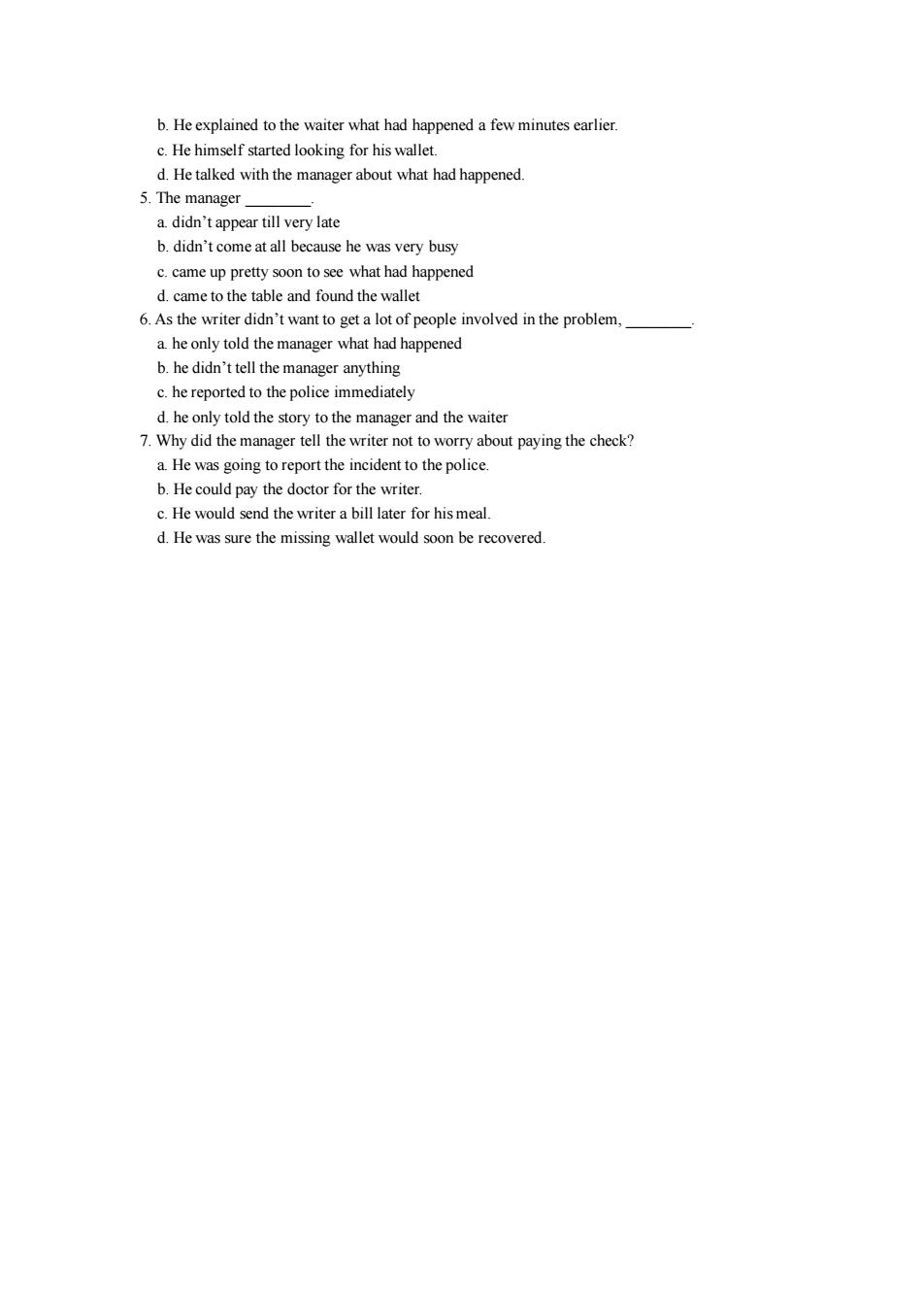
b.He explained to the waiter what had happened a few minutesearlier. .He himsef started looking for his walle d.He talked with the manager about what had happened 5.The manager a.didn't appear till very late b.didn't come at all because he was very busy c.came up prett oswhat had happene d.came to the ta e and found the walle 6.As the writer didn't want to get a lot of people involved in the problem, a.he only told the manager what had happened b.he didn't tell the manager anything .he reported to thepoliceimmediately d.he only told the story to the manager and the waite 7.Why did the manager tell the writer not toworry about paying the check a.He was going to report the incident to the police. b.He could pay the doctor for the writer. c He would send the writer a bill later for his meal d.He was sur the mising wallet wouldsoon be recovered
b. He explained to the waiter what had happened a few minutes earlier. c. He himself started looking for his wallet. d. He talked with the manager about what had happened. 5. The manager ________. a. didn’t appear till very late b. didn’t come at all because he was very busy c. came up pretty soon to see what had happened d. came to the table and found the wallet 6. As the writer didn’t want to get a lot of people involved in the problem, ________. a. he only told the manager what had happened b. he didn’t tell the manager anything c. he reported to the police immediately d. he only told the story to the manager and the waiter 7. Why did the manager tell the writer not to worry about paying the check? a. He was going to report the incident to the police. b. He could pay the doctor for the writer. c. He would send the writer a bill later for his meal. d. He was sure the missing wallet would soon be recovered
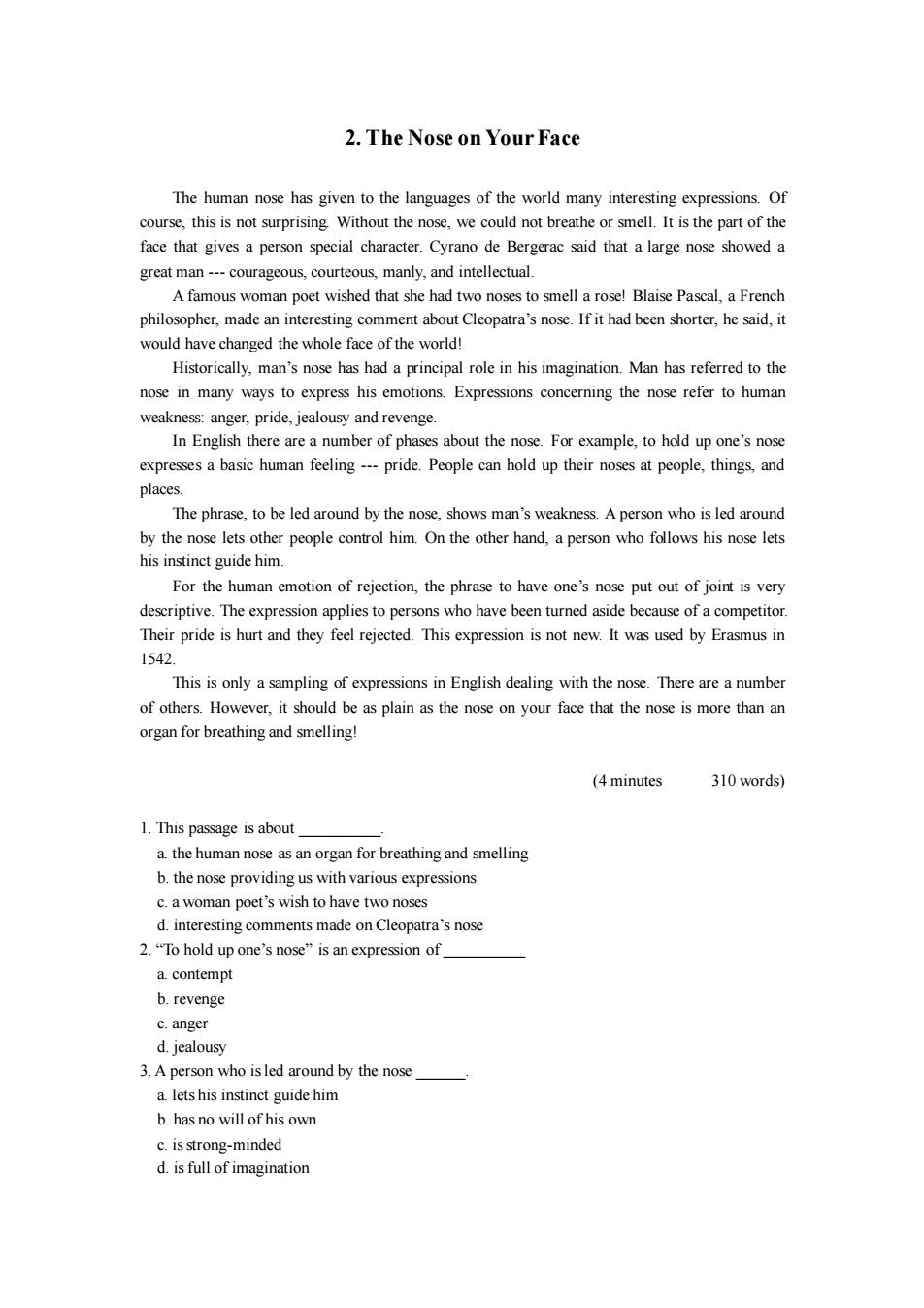
2.The Nose on Your Face The human nose has given to the languages of the world many interesting expressions.Of course.this is not surprising Without the nose.we could not breathe or smell.It is the part of the face that gives a person special character.Cyrano de Bergerac said that a large nose showed a great man cou Afamous oman poet philosopher,made an interesting comment about Cleopatra's nose.If it had been shorter,he said,it would have changed the whole face of the world! Historically,man's nose has had a principal role in his imagination.Man has referred to the nose in many ways to express his emotions.Expressions concerning the nose refer to human weaknes pride. and revenge In English there are a number of phass about the nose.For example.to hod up one's nos expresses a basic human feeling---pride.People can hold up their noses at people.things.and places. The phrase.to be led around by the nose.shows man's weakness.A person who is led around by the nose lets other people conro him.On the other hand,a person who follows his nose lets For the human emotion of rejection,the phrase to have one's nose put out of joint is very descriptive.The expression applies to persons who have been turned aside because of a competitor. Their pride is hurt and they feel rejected.This expression is not new.It was used by Erasmus in 1542. This is only a smpling of exp ssions in English dealing with the nos.There are a number of others.However,it should be as plain as the nose on your face that the nose is more than an organ for breathing and smelling! (4 minutes 310 words) 1.This passage is about a.the human nose as an organ for breathing and smelling b.the nose providing us with various expressions c.a woman poet's wish to have two noses d.interesting comments made on Cleopatra's nose 2.To hold upone's nose”is an expression of」 a.contempt b.revenge c.anger d.jealous 3.Aperson h isld around by the ne alets his instinct guide him b.has no will of his own c.is strong-minded d.is full of imagination
2. The Nose on Your Face The human nose has given to the languages of the world many interesting expressions. Of course, this is not surprising. Without the nose, we could not breathe or smell. It is the part of the face that gives a person special character. Cyrano de Bergerac said that a large nose showed a great man --- courageous, courteous, manly, and intellectual. A famous woman poet wished that she had two noses to smell a rose! Blaise Pascal, a French philosopher, made an interesting comment about Cleopatra’s nose. If it had been shorter, he said, it would have changed the whole face of the world! Historically, man’s nose has had a principal role in his imagination. Man has referred to the nose in many ways to express his emotions. Expressions concerning the nose refer to human weakness: anger, pride, jealousy and revenge. In English there are a number of phases about the nose. For example, to hold up one’s nose expresses a basic human feeling --- pride. People can hold up their noses at people, things, and places. The phrase, to be led around by the nose, shows man’s weakness. A person who is led around by the nose lets other people control him. On the other hand, a person who follows his nose lets his instinct guide him. For the human emotion of rejection, the phrase to have one’s nose put out of joint is very descriptive. The expression applies to persons who have been turned aside because of a competitor. Their pride is hurt and they feel rejected. This expression is not new. It was used by Erasmus in 1542. This is only a sampling of expressions in English dealing with the nose. There are a number of others. However, it should be as plain as the nose on your face that the nose is more than an organ for breathing and smelling! (4 minutes 310 words) 1. This passage is about __________. a. the human nose as an organ for breathing and smelling b. the nose providing us with various expressions c. a woman poet’s wish to have two noses d. interesting comments made on Cleopatra’s nose 2. “To hold up one’s nose” is an expression of __________ a. contempt b. revenge c. anger d. jealousy 3. A person who is led around by the nose ______. a. lets his instinct guide him b. has no will of his own c. is strong-minded d. is full of imagination
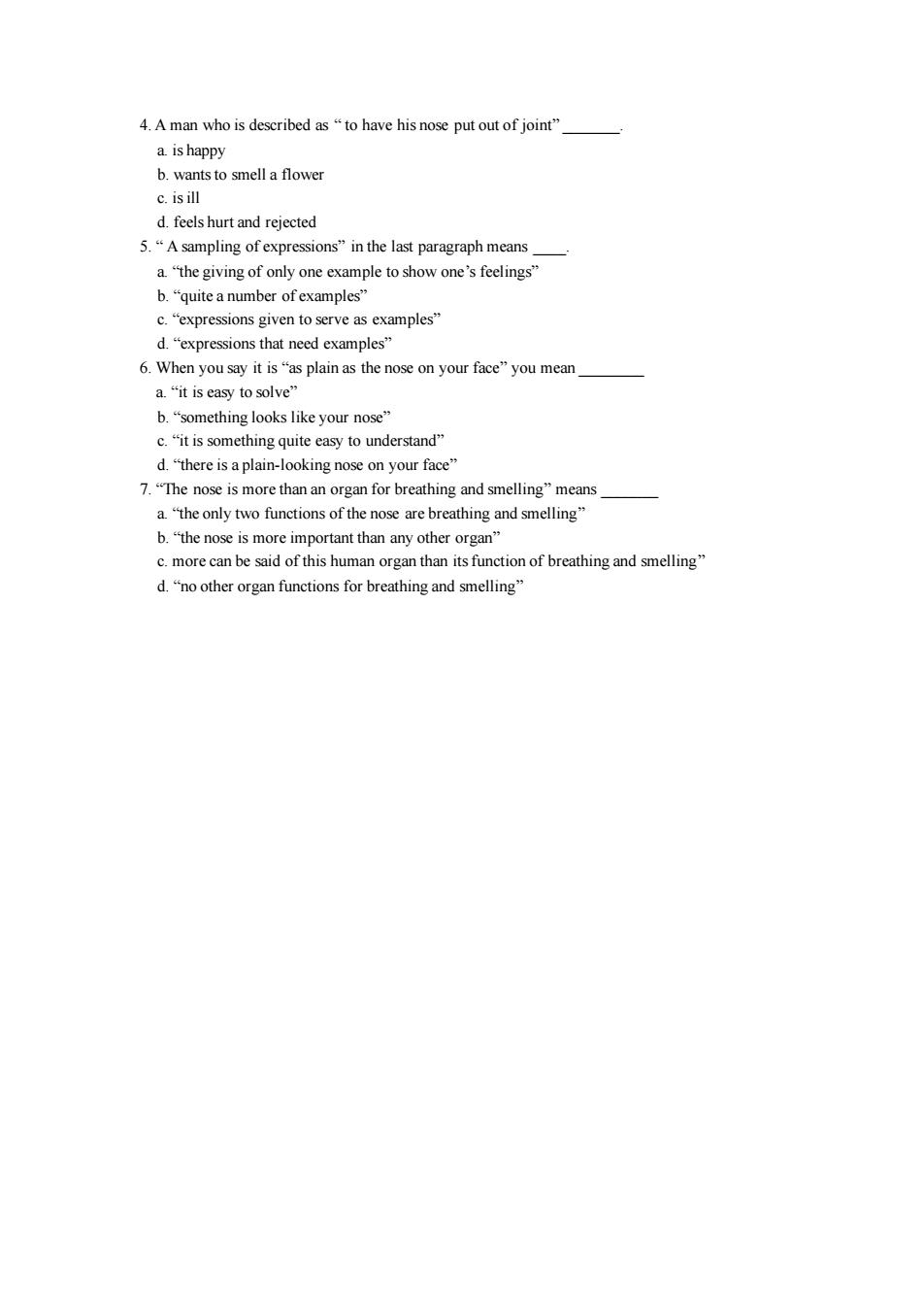
4.A man who is described as"to have his nose put out of joint" a is happy b.wants to smell a flower c.is ill d.feelshurt and rejected 5."A sampling of expressions"in the last paragraph means athe giving of only one xa c."expressions given to serve as examples" d."expressions that need examples" 6.When you say it is"as plain as the nose on your face"you mean a."'it is easy to solve” b."something looks like your nose" c."it is something quite easy to understand" d."there is a plain-looking nose on your face" 7."The nose is more than an organ for breathing and smelling"means a.the only two functions of the nose are breathing and smelling" b.theose is more im ortant than anyoth mor c mution of brehins and smling d."no other organ functions for breathing and smelling
4. A man who is described as “ to have his nose put out of joint” _______. a. is happy b. wants to smell a flower c. is ill d. feels hurt and rejected 5. “ A sampling of expressions” in the last paragraph means ____. a. “the giving of only one example to show one’s feelings” b. “quite a number of examples” c. “expressions given to serve as examples” d. “expressions that need examples” 6. When you say it is “as plain as the nose on your face” you mean ________ a. “it is easy to solve” b. “something looks like your nose” c. “it is something quite easy to understand” d. “there is a plain-looking nose on your face” 7. “The nose is more than an organ for breathing and smelling” means _______ a. “the only two functions of the nose are breathing and smelling” b. “the nose is more important than any other organ” c. more can be said of this human organ than its function of breathing and smelling” d. “no other organ functions for breathing and smelling
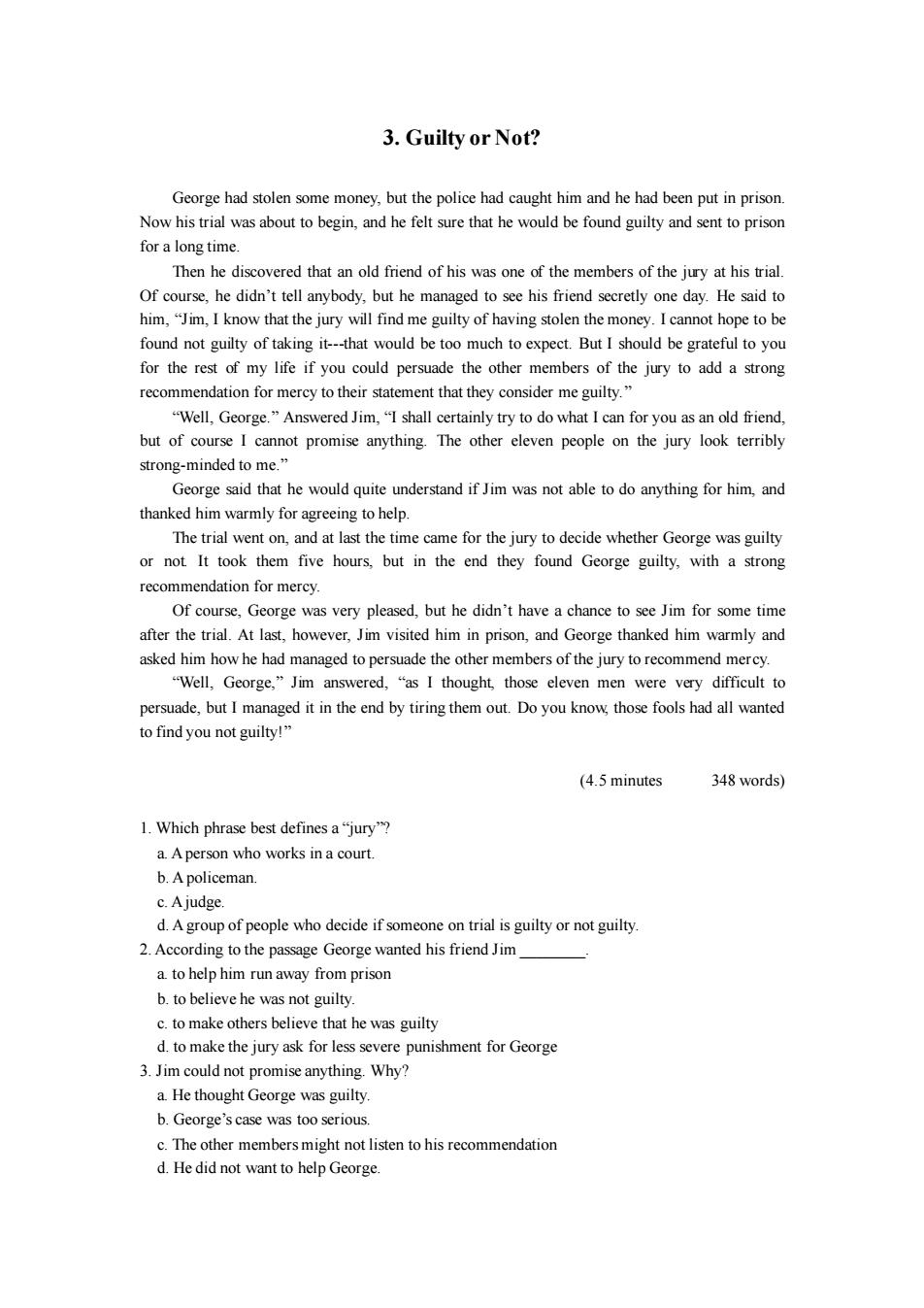
3.Guilty or Not? George had stolen some money,but the police had caught him and he had been put in prison Now his trial was about to begin.and he felt sure that he would be found guilty and sent to prison for a long time. Then he disco vered that an od friend of his wason of the members of the jury at his rial he didn anybod but he managed to see his friend secretly one day.He said him,"Jim,I know that the jury will find me guilty of having stolen the money.I cannot hope to b found not guilty of taking it---that would be too much to expect.But I should be grateful to you for the rest of my life if you could persuade the other members of the jury to add a strong recommendation for mercy to their statement that they consider me guilty." Well,George."Answered certainly try to do what can for you but of course I cannot promise anything.The other eleven people on the jury look terribly strong-minded to me. George said that he would quite understand if Jim was not able to do anything for him.and thanked him warmly for agreeing to help. The trial at last the time came for the jury to decide whether George was guilty or not It took them five hours,but in e end they found George guilty,w th a strong recommendation for mercy. Of course.George was very pleased.but he didn't have a chance to see Jim for some time after the trial.At last,however,Jim visited him in prison,and George thanked him warmly and asked him howhe had managed topersuade the other members of the jury mercy Well.George we d.s I thought elever but eed it in the end by tiring them out.Do you know those fools had all wanted to find you not guilty! (4.5 minutes 348 words) 1.Which phrase best defines a"jury a.Aperson who works in a court. b.Apoliceman. c.Ajudge. d.Agroup of people who decide if someone on trial is guilty or not guilty 2.According to the passage George wanted his friend Jin a to help him run away from prison b.to believe he was not guilty c.to make others believe that he was guilty d.to make the jury ask for less severe punishment for George aHe thought George was guilty b.George's case was too serious c.The other members might not listen to his recommendation d.Hedid not want to help George
3. Guilty or Not? George had stolen some money, but the police had caught him and he had been put in prison. Now his trial was about to begin, and he felt sure that he would be found guilty and sent to prison for a long time. Then he discovered that an old friend of his was one of the members of the jury at his trial. Of course, he didn’t tell anybody, but he managed to see his friend secretly one day. He said to him, “Jim, I know that the jury will find me guilty of having stolen the money. I cannot hope to be found not guilty of taking it---that would be too much to expect. But I should be grateful to you for the rest of my life if you could persuade the other members of the jury to add a strong recommendation for mercy to their statement that they consider me guilty.” “Well, George.” Answered Jim, “I shall certainly try to do what I can for you as an old friend, but of course I cannot promise anything. The other eleven people on the jury look terribly strong-minded to me.” George said that he would quite understand if Jim was not able to do anything for him, and thanked him warmly for agreeing to help. The trial went on, and at last the time came for the jury to decide whether George was guilty or not. It took them five hours, but in the end they found George guilty, with a strong recommendation for mercy. Of course, George was very pleased, but he didn’t have a chance to see Jim for some time after the trial. At last, however, Jim visited him in prison, and George thanked him warmly and asked him how he had managed to persuade the other members of the jury to recommend mercy. “Well, George,” Jim answered, “as I thought, those eleven men were very difficult to persuade, but I managed it in the end by tiring them out. Do you know, those fools had all wanted to find you not guilty!” (4.5 minutes 348 words) 1. Which phrase best defines a “jury”? a. A person who works in a court. b. A policeman. c. A judge. d. A group of people who decide if someone on trial is guilty or not guilty. 2. According to the passage George wanted his friend Jim ________. a. to help him run away from prison b. to believe he was not guilty. c. to make others believe that he was guilty d. to make the jury ask for less severe punishment for George 3. Jim could not promise anything. Why? a. He thought George was guilty. b. George’s case was too serious. c. The other members might not listen to his recommendation d. He did not want to help George